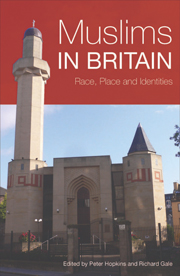Book contents
- Frontmatter
- Contents
- Acknowledgements
- List of contributors
- List of tables
- List of figures
- 1 Introduction: Muslims in Britain – race, place and the spatiality of identities
- Section 1 Gender, place and culture
- Section 2 Landscapes, communities and networks
- Section 3 Religion, race and difference
- 10 Situating Muslim geographies
- 11 Muslims and the politics of difference
- 12 Islamophobia in the construction of British Muslim identity politics
- Afterword
- Index
12 - Islamophobia in the construction of British Muslim identity politics
from Section 3 - Religion, race and difference
Published online by Cambridge University Press: 05 August 2013
- Frontmatter
- Contents
- Acknowledgements
- List of contributors
- List of tables
- List of figures
- 1 Introduction: Muslims in Britain – race, place and the spatiality of identities
- Section 1 Gender, place and culture
- Section 2 Landscapes, communities and networks
- Section 3 Religion, race and difference
- 10 Situating Muslim geographies
- 11 Muslims and the politics of difference
- 12 Islamophobia in the construction of British Muslim identity politics
- Afterword
- Index
Summary
I am a proud British Muslim. I am close to my community and they are really proud that I am training to be a doctor. I would never give up that heritage. I feel I have nothing in common with all this multiculturalism stuff. Where were all those black brothers and sisters when we were being attacked over Rushdie? Did the CRE say anything to support us? My links are international. We are developing a modern, cosmopolitan Islamic network across the world.
(Muslim female, 20 cited in Alibhai-Brown 2000: 25)As has been commonly observed, questions of identity and, in particular, of identity politics have become central to public deliberation and theoretical debate. It is the contention of this chapter that much debate over identity has been overly concerned with discussions around anti-essentialism and that it should rather focus on the interplay between personal and political agency and its troubled, unstable manifestation as ‘identity politics’, as Stuart Hall suggests (2000b: 16). But troubling to anti-essentialists is the fact that identity movements conflate personal and public identities and that in the act of mobilisation they cut across other social identities—and herein lies their power to challenge prevailing norms (Werbner 1997). The young woman in the above quote conflates different strands together with proud self-awareness: her Britishness, Muslimness, professionalism, international connections and cosmopolitan modern faith, rejecting what she sees as any pre-packaged multiculturalist or anti-racist identity.
- Type
- Chapter
- Information
- Muslims in BritainRace, Place and Identities, pp. 210 - 227Publisher: Edinburgh University PressPrint publication year: 2009



